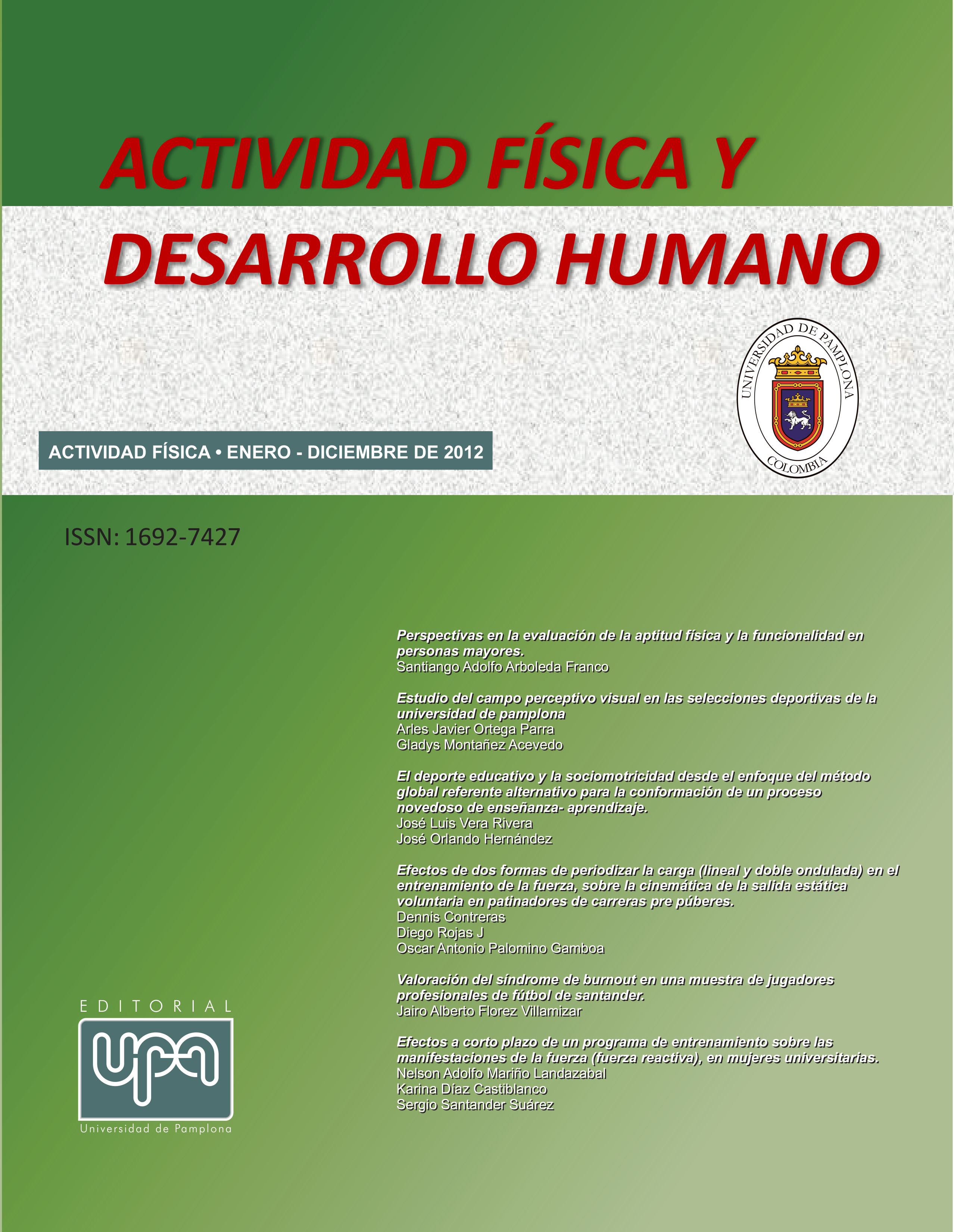El deporte educativo y la sociomotricidad desde el enfoque del método global referente alternativo para la conformación de un proceso novedoso de enseñanza - aprendizaje
DOI:
https://doi.org/10.24054/afdh.v4i1.1715Palabras clave:
Deporte educativo, didáctica, educación física, socio motricidadResumen
Son varias las tendencias contemporáneas de la clase de educación física recrea- ción y deportes; en la literatura especializada generalmente se escribe mucho sobre el deporte, la recreación, la expresión corporal el ritmo, movimiento, la actividad física sistemática, la cultura física terapéutica, la administración de empresas deportivas, entre otras, que dan una gran riqueza de contenidos para guiar una clase de educación física mas integral y menos analítica tradicionalista de carácter militar.
El deporte sin duda alguna es una de las unidades más utilizadas en los programas de educación física, inclusive en los países de alto desarrollo deportiva se utiliza como mecanismo de iniciación y fundamentación de los niños que asisten a las escuelas, es más, a los niños que se consideran que tienen talento deportivo los llevan a escuelas específicas donde son formados como deportistas de alto rendimiento, en donde la clase de educación física pasa hacer una sesión bien controlada y estructurada de entrenamiento deportivo.
En el presente trabajo se da a conocer la formulación de la siguiente investigación, que tiene como propósito la utilización de la planificación pedagógica y de las adapta- ciones didácticas de cómo abordar la enseñanza de los deportes desde el punto de vista educativo tratando de incentivar la motivación, la integración y el trabajo en equipo de los escolares buscando, de esta forma, un alternativa para guiar la enseñanza – apren- dizaje del deporte en la clase de educación física con un enfoque más participativo y integral, en donde el talento deportivo no sea lo más importante sino la consecución de objetivos a través del trabajo en equipo.
Descargas
Referencias
Álvarez, R. (1996). Diseño curricular. Instituto Pedagógico Latinoamericano y Caribeño. Cátedra UNESCO en Ciencias de la Educación.
Cagigal, J. M. (1981). Ocio y deporte en nuestro tiempo. Cátedras universitarias de tema deportivo-cultural, (2), 83–129.
Cagigal, J. M. (1996). Obras selectas (Vol. I). Cádiz: COE.
Cajigal, J. M. (1979). Cultura intelectual y cultura física. Buenos Aires: Kapelusz.
Camacho, H. (1992). Alternativa curricular para educación física en secundaria. Universidad Surcolombiana.
Chinchilla, V. J. (s.f.). Educación física como proceso cultural y social. Ponencia presentada en el VI Congreso Colombiano de Educación Física, INEFC, Barcelona.
Delgado, M. A. (1991). Los estilos de enseñanza en la educación física: Propuesta para una reforma de la enseñanza. Universidad de Granada, Departamento de Teoría e Historia de la Educación. Gymnos.
Del Villar, F. (1993). El desarrollo del conocimiento práctico de los profesores de EF a través de un programa de análisis de la práctica docente: Un estudio de casos en formación inicial [Tesis doctoral inédita]. Universidad de Granada.
Díaz, A. (1988). Teoría y práctica del diseño curricular. Madrid: Morata.
Famose, J. P. (1992). Aprendizaje motor y dificultad de la tarea. Paidotribo.
Hernández, J. (1994). Fundamentos del deporte. Barcelona: Paidotribo.
Hernández, R., Fernández, C. & Baptista, P. (2006). Metodología de la investigación (4.ª ed.). McGraw Hill.
Lagardera, F. (1989). Educación física sistémica: Una pedagogía renovadora. Apunts: Educación Física y Deportes, (n.º desconocido).
Lagardera, F. (1990a). Una interpretación de la cultura deportiva en torno a los orígenes. (Revista no especificada).
Lagardera, F. (1990b). La educación física en la enseñanza secundaria obligatoria. (Revista no especificada).
Lagardera, F. (1992). Sobre aquello que puede educar la educación física. (Revista no especificada).
Lagardera, F. (1993a). Bases epistemológicas de la educación física escolar. I Simposium. (Lugar no especificado).
López, A. & Maura, V. (2001). Niveles de satisfacción por la clase de educación física. Revista Digital EFDeportes, 6(32). http://www.efdeportes.com/efd32/satisfaccion.htm
López, A. & Maura, V. (2002a). La calidad de la clase de educación física: Una guía de observación cualitativa para su evaluación. Revista Digital EFDeportes, 8(48). http://www.efdeportes.com/efd48/clase.htm
López, A. & Maura, V. (2002b). La técnica de IADOV: Una aplicación para el estudio de la satisfacción de los alumnos para las clases de educación física. Revista Digital EFDeportes, 8(47). http://www.efdeportes.com/efd47/iadov.htm
López, A. & Maura, V. (2003). ¿Es la educación física, ciencia? Revista Digital EFDeportes, 9(62). http://www.efdeportes.com/efd62/ciencia.htm
López, A. & Moreno, J. A. (2002). Aprendizaje de hechos y conceptos en educación física. Apunts: Educación Física y Deportes, (69), Barcelona.
López, A. & Vega, C. (1996). La clase de educación física: Actualidad y perspectivas. México: Ediland.
López, A. & Vega, C. (2000). Tendencias contemporáneas de la clase de educación física. Cuadernos IMCED. Serie Pedagógica, (26). Morelia, Michoacán, México.
Matos, C., et al. (1998). Manual básico del investigador. Universidad Pedagógica de Guantánamo. La Habana, Cuba.
Moreno, A., et al. (1999). Serie Aprender a Investigar. Módulo 3 y 4: Recolección y análisis de la información [Versión electrónica]. ICFES.
Padrón, J. (2002). Consejos para un tesista. http://www.ideassapiens.com.feb
Parlebas, P. (1981). Praxiología en los juegos deportivos. París: INSEP.
Parlebas, P. (1981). Contribution à un lexique commenté en science de l'action motrice. México: Ediland.
Parlebas, P. (1988). Elementos para una sociología del deporte. Málaga: Unisport.
Parlebas, P. (1989). Perspectivas para una educación física moderna. Málaga: Unisport.
Pieron, M. (1989). Didáctica de las actividades físicas y deportivas. Madrid: Gymnos.
Ruiz, A. & López, A. (1986). Metodología de la educación física (Tomo I). Ciudad de La Habana: Editorial Pueblo y Educación.
Saénz-López, P. (1997). Educación física y su didáctica: Manual para el profesor. (Editorial no especificada).
Sánchez Bañuelos, F. (1986). Didáctica de la educación física y el deporte. (Editorial no especificada).
Seybold, A. (1974). Principios pedagógicos en la educación física. Sevilla: Wanceulen / Kapelusz.
Descargas
Publicado
Número
Sección
Licencia
Derechos de autor 2012 ACTIVIDAD FÍSICA Y DESARROLLO HUMANO

Esta obra está bajo una licencia internacional Creative Commons Atribución-NoComercial-SinDerivadas 4.0.











